 To enhance service speed and avoid tariff delays, we've opened a US warehouse. All US orders ship directly from our US facility.
To enhance service speed and avoid tariff delays, we've opened a US warehouse. All US orders ship directly from our US facility.
| Cat. No. | Product Name | Field of Application | Chemical Structure |
|---|---|---|---|
| DC77846 | Afovirsen |
Afovirsen is a 20-mer phosphorothioate oligonucleotide. It is complementary to the mRNA sequence for the translation initiation codon of the E2 protein vital to replication of HPV types 6 and 11.
More description
|

|
| DC77845 | Afovirsen sodium |
Afovirsen sodium is a 20-mer phosphorothioate oligonucleotide. It is complementary to the mRNA sequence for the translation initiation codon of the E2 protein vital to replication of HPV types 6 and 11.
More description
|

|
| DC77844 | A9g sodium |
A9g sodium is an RNA aptamer that inhibits the enzymatic activity of prostate-specific membrane antigen (PSMA).
More description
|

|
| DC77843 | 148.1-38m sodium |
148.1-38m sodium, an RNA aptamer, inhibits HIV-1 reverse transcriptase (RT) and interfere with viral replication.
More description
|

|
| DC77842 | Calderasib (MK-1084) |
Calderasib (MK-1084) is a selective KRAS G12C inhibitor demonstrating antitumor efficacy. It can be utilized as monotherapy or in combination with pembrolizumab () for oncology research.
More description
|

|
| DC77841 | Cephalexin hydrochloride |
Cephalexin (hydrochloride, Cefalexin hydrochloride) is a potent, orally active cephalosporin antibiotic with broad-spectrum activity. It acts by binding to penicillin-binding proteins (PBPs), thereby disrupting bacterial cell wall synthesis. Cephalexin hydrochloride demonstrates antibacterial activity against a wide variety of gram-positive and gram-negative bacteria.
More description
|

|
| DC77840 | Emzadirib |
Emzadirib, an inhibitor of RAD51, exhibits a reduction in RAD51 foci. This compound displays significant anti-tumor activity with tumor growth inhibition in in vivo and in vitro models.
More description
|

|
| DC77839 | Ribociclib succinate hydrate |
Ribociclib succinate hydrate is an orally bioavailable and selective, inhibitor of both CDK4 and CDK6 with IC50 values of 10 nM and 39 nM, respectively. It exhibits anticancer activitiy and can be used in breast cancer, melanoma, liposarcoma, non–small cell lung cancer, and neuroblastoma therapy research.
More description
|

|
| DC77838 | PolQi2 |
PolQi2 is a PolΘ inhibitor that specifically targets the N-terminal helicase domain of PolΘ, thereby suppressing alt-EJ (alternative end-joining) repair. This compound improves the accuracy and integration efficiency of gene editing across multiple loci and diverse cell lines. Additionally, it demonstrates synergistic effects with DNA-PK inhibitors in reducing Cas9-mediated off-target activity. Its application is suitable for gene editing studies.
More description
|

|
| DC77837 | RMC5127 |
RMC5127 is a first-in-class, orally bioavailable mutant-selective tri-complex inhibitor of the GTP-bound (ON) form of RASG12V. It non-covalently binds to cyclophilin A (CypA), forming a binary complex that engages RASG12V(ON) to form a high-affinity tri-complex, sterically inhibiting RAS binding. It inhibits the RAS pathway in KRASG12V-mutant cancer cells, reducing proliferation, inducing apoptosis, and showing strong potential for use in RASG12V-mutated cancer research.
More description
|

|
| DC77836 | TNG348 |
TNG348 is an orally bioavailable allosteric inhibitor targeting the ubiquitin-specific protease USP1. It selectively and potently blocks USP1 activity, preventing deubiquitination of proliferative PCNA and FANCD2, which disrupts DNA repair mechanisms. TNG348 demonstrates inhibitory effects against BRCA1/2-mutated and homologous recombination-deficient (HRD) breast and ovarian cancers .
More description
|

|
| DC77835 | BI033 |
BI033 is a selective inhibitor of BTB and CNC homology 1 (BACH1) specifically binds to BACH1's N-terminal with a Kd of 9.0 uM. It disrupts the BACH1–HDAC1 interaction, enhances H3K27 acetylation at BACH1 target genes, and upregulates angiogenic genes, suggesting its therapeutic potential for myocardial infarction and ischemic vascular disease.
More description
|

|
| DC77834 | Peptide 4 |
Peptide 4 is a complex synthetic peptide molecule commonly used as a research chemical or therapeutic agent due to its potential to mimic biological peptides and modulate specific molecular targets.
More description
|

|
| DC77833 | CT1113 |
CT1113 is a potent dual inhibitor of USP25 and USP28 that effectively reduces c-MYC levels and exhibits strong anti-tumor activity. It can be used in research on colon and pancreatic cancers.
More description
|

|
| DC77832 | Taurolithocholic acid |
Taurolithocholic acid is a taurine-conjugated tertiary bile acid. It induces apoptosis in hepatoma cell lines via caspase-3/7 activation and serves as a model to study the endocrine and metabolic roles of bile acids in enterohepatic circulation and liver physiology.
More description
|

|
| DC77830 | PB94 |
PB94 is a potent and selective inhibitor of HDAC11 with an IC50 of 108 nM and exhibits >40-fold selectivity over other HDAC isoforms. It ameliorates neuropathic pain in mouse models and can be radiolabeled with carbon-11 as [¹¹C]this compound for PET imaging, demonstrating significant brain uptake and potential for in vivo imaging applications.
More description
|

|
| DC77829 | SKLB-11A |
SKLB-11A is a selective, first-in-class allosteric activator of SIRT3 that binds with a Kd of 4.7 μM and enhances its deacetylase activity with EC50 of 21.95 μM. It improves cardiac function and alleviates myocardial damage in vivo.
More description
|

|
| DC77828 | BIEGi-1 |
BIEGi-1 is a potent and selective binary inhibitor of EGFR that effectively blocks EGFR-catalyzed nucleotide exchange and disrupts the EGFR–Rheb interaction. It robustly inhibits both EGFR kinase activity and mTORC1 signaling in EGFR-mutant cancer cells. This compound exhibits significant anti-proliferative effects with an IC50 of 17 nM for PC9 and 20 nM for HCC827.
More description
|

|
| DC77827 | BSJ-5-63 |
BSJ-5-63 is a potent PROTAC degrader of CDK12, CDK7, CDK9. BSJ-5-63 decreases the protein expression of CDK12, CDK7, CDK9, RNAPII, Cyclin K, while also suppressing the mRNA expression of BRCA1 and BRCA2. BSJ-5-63 demonstrates anticancer properties and has the potential for the research of prostate cancer.
More description
|

|
| DC75934 | (-)-Luteoskyrin |
(-)-Luteoskyrin has a wide range of antibacterial activity, such as against malaria (with an IC50 of 0.51 μg/mL), tuberculosis (MIC of 6.25 μg/mL), and it also shows antibacterial effects (with MIC for Gram-positive bacteria ranging from 0.39 to 1.56 μg/mL, and for Gram-negative bacteria from 3.13 to 12.50 μg/mL), as well as antifungal activity (with MIC against plant pathogens ranging from 3.13 to 50μg/mL). (-)-Luteoskyrin exhibits cytotoxicity against NCI-H187 cells, with an IC50 range of 0.16–17.99 μg/mL.
More description
|

|
| DC40420 | ARCC-4 Featured |
ARCC-4 is a low-nanomolar androgen receptor (AR) degrader based on PROTAC, with a DC50 of 5?nM. ARCC-4 is an enzalutamide-based von Hippel-Lindau (VHL)-recruiting AR PROTAC and outperforms enzalutamide. ARCC-4 effectively degrades clinically relevant AR mutants associated with antiandrogen therapy.
More description
|
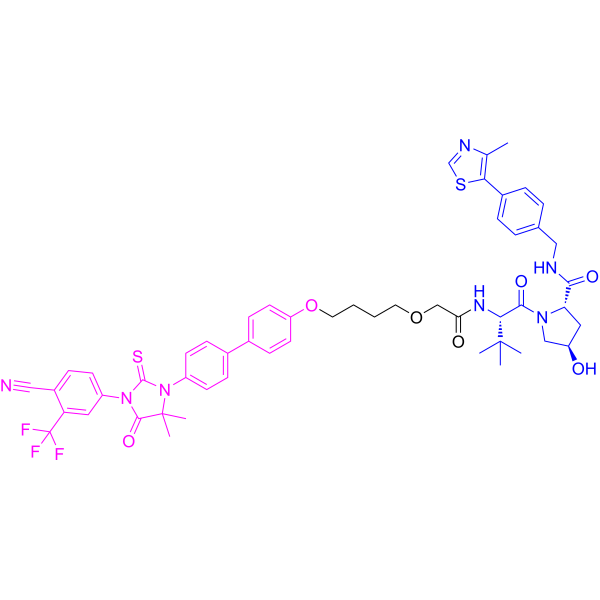
|
| DC26122 | Pomalidomide-C2-NH2 hydrochloride Featured |
Pomalidomide-C2-NH2 hydrochloride is a synthesized E3 ligase ligand-linker conjugate that incorporates the Pomalidomide based cereblon ligand and a linker used in PROTAC technology.
More description
|
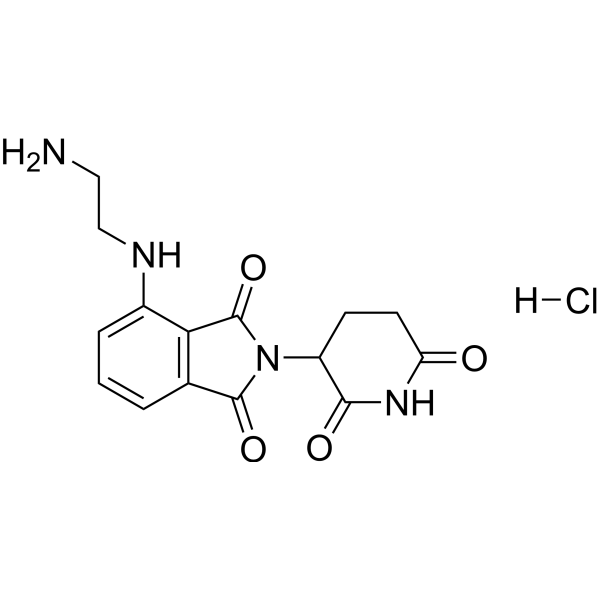
|
| DC11573 | E3 Ligand-Linker Conjugate 7 Featured |
An E3 ligase ligand-linker conjugate for PROTAC..
More description
|
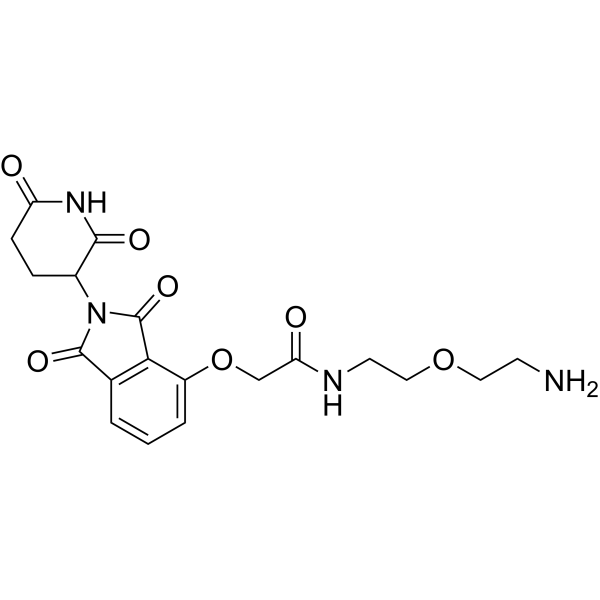
|
| DC21962 | TL13-12 Featured |
TL13-12 is a novel Anaplastic Lymphoma Kinase (ALK)-PROTAC developed through conjugation of TAE684 and the cereblon ligand pomalidomide.
More description
|
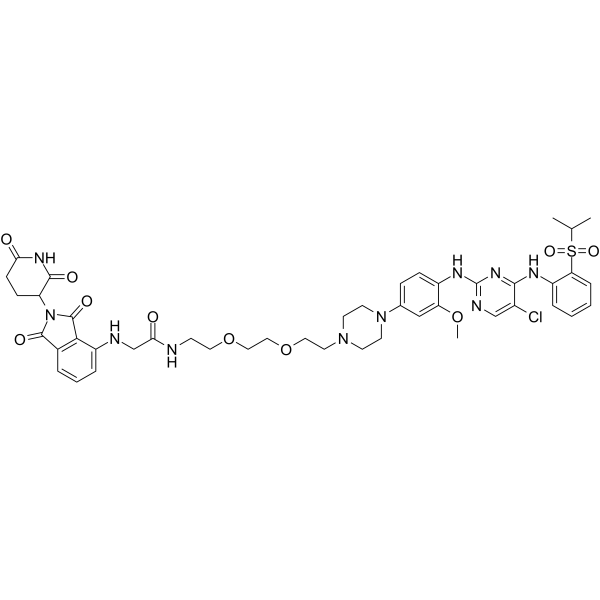
|
| DC21893 | dBET57 Featured |
dBET57 is a novel BRD4 heterobifunctional small-molecule ligand (PROTAC), exhibits significant and selective degradation of BRD4 BD1 (DC50/5h=500 nM), but is inactive on BRD4 BD2..
More description
|
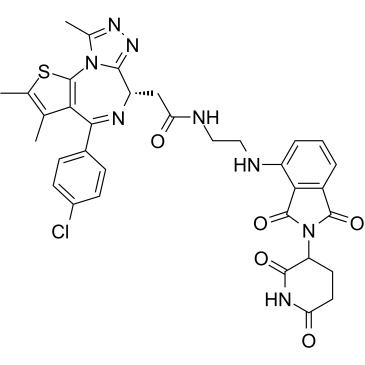
|
| DC40447 | N-piperidine Ibrutinib hydrochloride Featured |
N-piperidine Ibrutinib hydrochloride (Compound 1) is a reversible Ibrutinib derivative. N-piperidine Ibrutinib hydrochloride is a potent BTK inhibitor with IC50s of 51.0 and 30.7 nM for WT BTK and C481S BTK, respectively. N-piperidine Ibrutinib hydrochloride can be used as a BTK ligand in the synthesis of a series of PROTACs, such as SJF620. SJF620 is a potent PROTAC BTK degrader with a DC50 of 7.9 nM.
More description
|
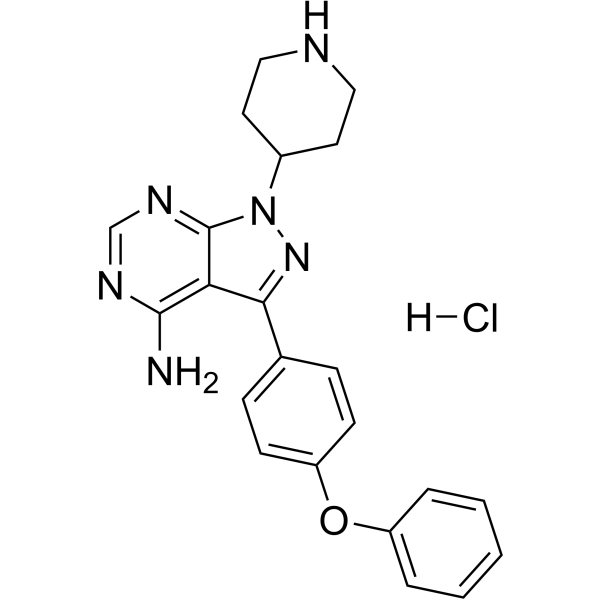
|
| DC40428 | Pomalidomide 4'-alkylC5-acid Featured |
Pomalidomide 4'-alkylC5-acid is a synthesized E3 ligase ligand-linker conjugate that incorporates the Pomalidomide based cereblon ligand and a PEG linker used in PROTAC technology.
More description
|

|
| DC42553 | Pomalidomide-PEG3-azide Featured |
Pomalidomide-PEG3-azide is a synthesized E3 ligase ligand-linker conjugate that incorporates the Pomalidomide based cereblon ligand and 3-unit PEG linker used in PROTAC technology.
More description
|
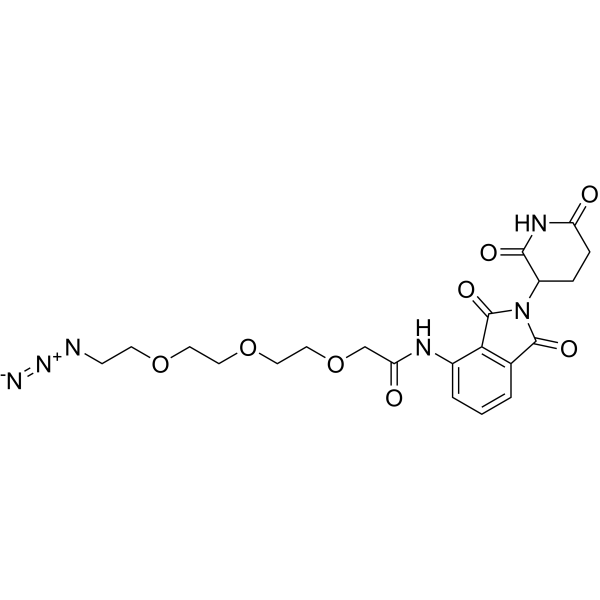
|
| DC49083 | PROTAC-O4I2 Featured |
PROTAC-O4I2 is a PROTAC targets splicing factor 3B1 (SF3B1). PROTAC-O4I2 induces FLAG-SF3B1 degradation with an IC50 value of 0.244 μM in K562 cells. PROTAC-O4I2 also induces cellular apoptosis in K562 WT cells.
More description
|
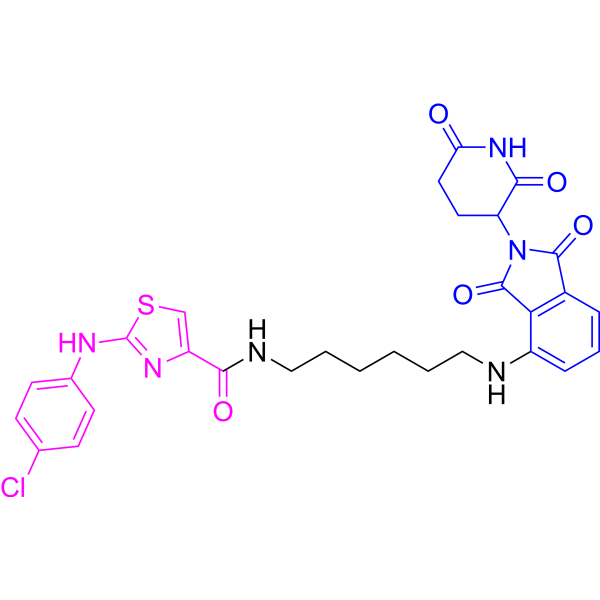
|
| DC44858 | Thalidomide-O-C4-COOH Featured |
Thalidomide-O-C4-COOH is a synthesized E3 ligase ligand-linker conjugate that incorporates the Thalidomide based cereblon ligand and a linker used in PROTAC technology.
More description
|
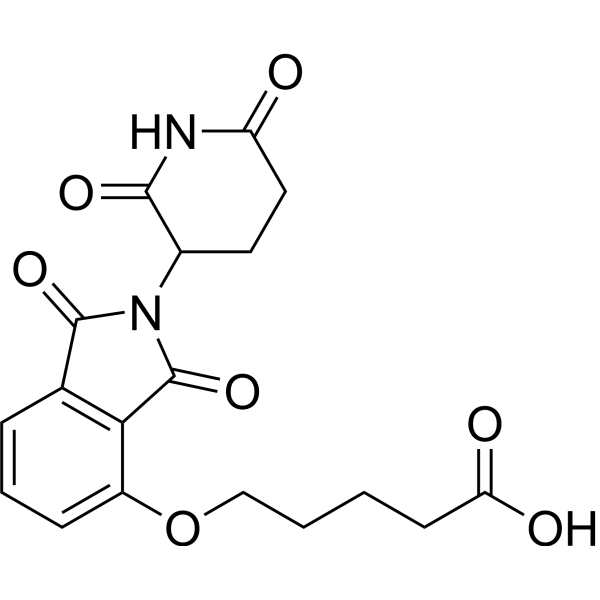
|